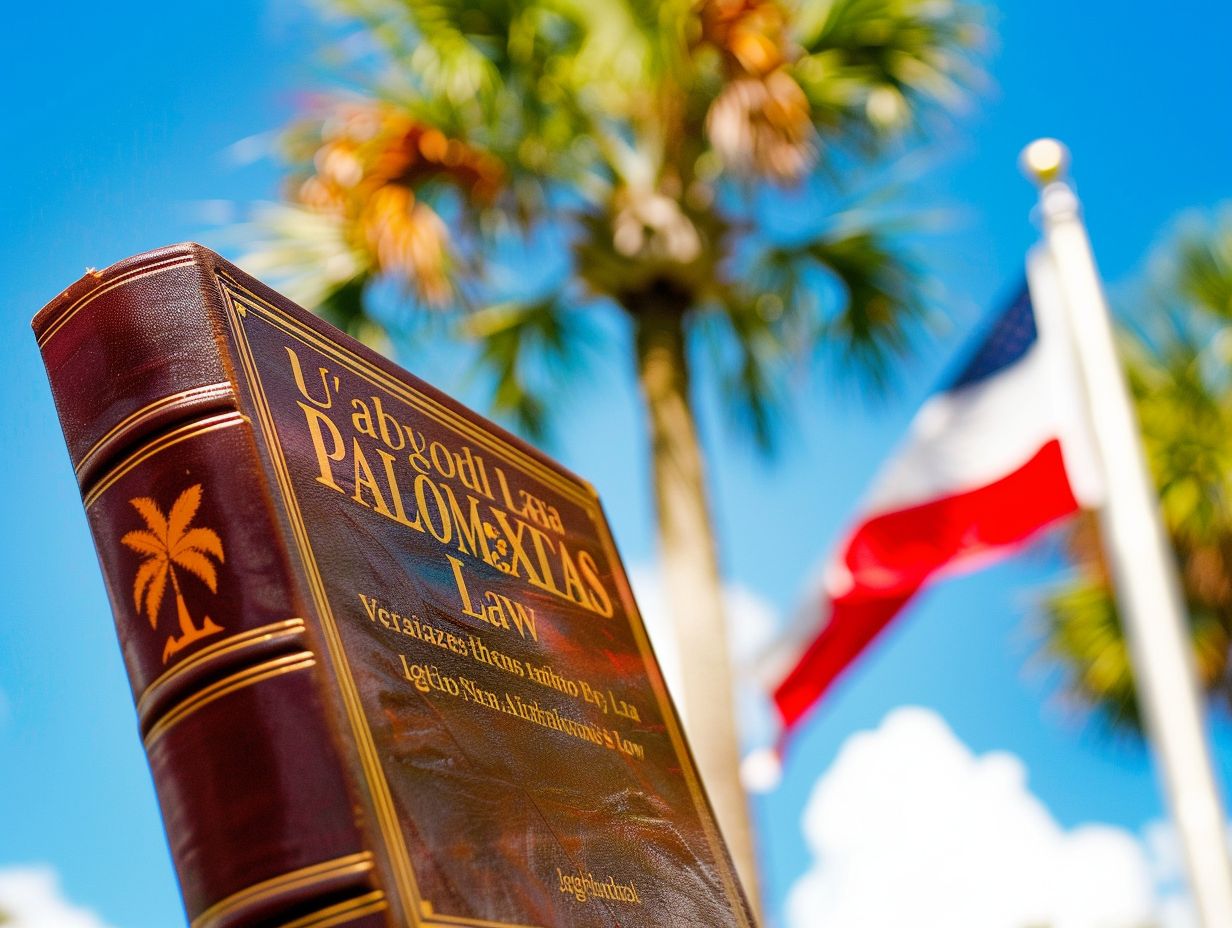Interested in understanding Florida’s Administrative Law? This comprehensive guide will delve into the intricacies of this specialized area of law, exploring the roles of administrative agencies and the courts, as well as the sources and principles that govern administrative law in Florida.
From the enforcement of rules and regulations to common issues faced in this field, this article will provide you with a thorough understanding of Florida’s Administrative Law landscape. So, let’s dive in and explore the complexities of this important legal framework.
Key Takeaways:

- Administrative law in Florida governs the actions of state agencies and their relationships with individuals and businesses.
- Administrative law is unique because administrative agencies have the power to create, enforce, and interpret their own rules and regulations.
- The Florida Administrative Procedure Act, Florida Administrative Code, and Florida Administrative Weekly are key sources of administrative law in the state.
What is Administrative Law?
Administrative law is a branch of public law that oversees the operations of government agencies in Florida and other regions. It encompasses various functions like rulemaking, adjudication, and enforcing specific regulatory agendas.
This legal framework is essential for ensuring that government agencies operate within their designated authority and adhere to established procedures. This promotes transparency and accountability in their activities.
By outlining clear rules and procedures for administrative decision-making, administrative law protects the rights of individuals and organizations impacted by government actions. In Florida, administrative law is crucial in overseeing state agency actions, influencing public policy, and promoting good governance practices.
How is Administrative Law Different from Other Types of Law?
Administrative law is distinct from other legal fields due to its emphasis on the regulatory functions of government agencies and its procedural structure, as opposed to substantive law matters that directly impact individual rights and responsibilities.
What is the Role of Administrative Agencies?
Administrative agencies are key players in administrative law, utilizing their rulemaking authority to establish regulations and carrying out enforcement actions to guarantee adherence to these regulations.
These agencies are integral components of the regulatory process, given their ability to interpret and implement laws passed by legislative bodies. Through the issuance of regulations, they furnish detailed instructions on adhering to the law, which is essential for businesses, organizations, and individuals.
Administrative agencies investigate infractions, levy penalties for non-compliance, and possess the power to issue cease and desist orders to halt unlawful activities. Their efforts are crucial in protecting the public interest and ensuring the effective operation of government policies.
What is the Role of the Courts in Administrative Law?
The courts have an important role in administrative law by conducting judicial review to verify that agency orders and regulations adhere to statutory and constitutional requirements.
Through the process of judicial review, courts serve as a critical check on the actions of administrative agencies, providing a means for individuals and entities to contest agency decisions. This oversight is crucial in upholding the rule of law and ensuring that agencies operate within the boundaries set by the legislature.
Courts examine agency actions to ensure they are legal, reasonable, and just, offering safeguards against potential abuses of authority. By holding agencies responsible for their decisions, judicial review helps maintain the separation of powers and encourages transparency and accountability in the administrative process.
What are the Sources of Administrative Law in Florida?
The sources of administrative law in Florida are mainly located in the Florida Statutes, the Florida Administrative Register, and the Florida Administrative Code. Each serves specific functions within the regulatory framework of the state.
What is the Florida Administrative Procedure Act?
The Florida Administrative Procedure Act (APA) establishes the legal framework governing the rulemaking process, adjudications, and other administrative actions, with supervision from the Joint Administrative Procedures Committee (JAPC).
Key features of the APA include mandates for public notice and comment periods, promoting openness and opportunities for stakeholder engagement. These features contribute to upholding principles of fairness and due process in administrative proceedings.
The JAPC plays a critical role in monitoring rulemaking to ensure agencies adhere to correct procedures, avoid arbitrary decisions, and comply with statutory obligations. By upholding adherence to procedural rules, the JAPC helps uphold the integrity and legitimacy of administrative actions in Florida.
What is the Florida Administrative Code?

The Florida Administrative Code (FAC) is a compilation of all administrative rules adopted by state agencies in Florida, serving as a comprehensive source of regulatory requirements.
The FAC plays a crucial role in the administrative rulemaking process by providing a centralized location for all regulations to be easily accessible to the public.
This compilation simplifies the task of locating specific rules and requirements put forth by various agencies, streamlining the process for businesses, individuals, and other entities to understand and comply with these regulations.
By fostering transparency and organization, the FAC enhances regulatory efficiency and promotes compliance. It acts as a valuable tool for those seeking regulatory information, contributing to a more informed and regulated environment within the state.
What is the Florida Administrative Weekly?
The Florida Administrative Weekly, now known as the Florida Administrative Register (FAR), is a publication that releases proposed rules, notices, and other regulatory actions to inform the public and solicit comments.
This publication allows individuals and organizations to keep abreast of the rulemaking process within state agencies. The FAR plays a critical role in promoting transparency, ensuring that the public is informed about proposed changes and has the opportunity to offer feedback. By facilitating public involvement, the FAR supports accountability and democracy in the regulatory process.
Acting as a conduit of communication between state agencies and the public, the FAR enables agencies to clarify their actions and receive input from stakeholders. This exchange of information helps improve the quality of regulations and policies by incorporating a variety of viewpoints.
What are the Main Principles of Florida Administrative Law?
The main principles of Florida administrative law encompass the separation of powers, due process, and judicial review, all working together to maintain a balanced and fair regulatory environment.
What is the Principle of Separation of Powers?
The principle of separation of powers in administrative law aims to prevent the executive branch, which includes administrative agencies, from encroaching on legislative or judicial functions.
By structuring the government into distinct branches with specific powers and duties, the system fosters a series of checks and balances. This setup allows each branch to check the powers of the others, promoting accountability and averting the dominance of any single branch.
For example, the legislative branch formulates laws, the executive branch enforces them, and the judicial branch interprets and applies them. This division of powers serves to prevent the abuse of authority by ensuring that no single branch exerts unchecked power over the others.
What is the Principle of Due Process?
The principle of due process in administrative law ensures that individuals and entities impacted by agency actions are entitled to fair procedures, which include the opportunity for public comment on proposed rules.
This principle acts as an important safeguard to prevent arbitrary decision-making and promote transparency in the administrative process. By permitting affected parties to express their concerns and offer input on regulatory changes, due process acts as a control against the possible misuse of power by regulatory agencies.
Public involvement in the rulemaking process enhances accountability and legitimacy in governance by allowing stakeholders to actively participate in shaping policies that have a direct impact on their lives and communities.
What is the Principle of Judicial Review?
Judicial review is a legal process that allows courts to assess the legality and fairness of agency orders and actions. It ensures that administrative decisions adhere to statutory and constitutional standards.
This process serves as an important safeguard against potential misuse of power by government bodies, as it makes them answerable for their actions. By subjecting administrative decisions to judicial examination, the system helps maintain a balance of power among the government branches.
This oversight guarantees that agencies operate within legal boundaries and do not exceed their jurisdiction. Judicial review reinforces the principles of transparency, accountability, and procedural fairness within administrative procedures, ultimately supporting the rule of law.
How are Administrative Rules and Regulations Enforced in Florida?
Administrative rules and regulations in Florida are enforced through a combination of agency enforcement actions, oversight by the Department of Business and Professional Regulation, and adjudication by the Division of Administrative Hearings (DOAH).
What is the Role of the Division of Administrative Hearings?

The Division of Administrative Hearings (DOAH) is tasked with conducting hearings and settling disputes stemming from agency actions, providing public access to case information through the DOAH Case Search.
These administrative hearings are vital for upholding transparency and ensuring fair resolution of disputes. When a case is brought to DOAH, the typical process involves appointing an administrative law judge to oversee the proceedings. Parties involved are given the chance to present evidence, call witnesses, and present legal arguments.
The decisions reached during these hearings can greatly influence the dispute’s outcome. The DOAH Case Search tool is essential for enabling public access to crucial information about ongoing cases, recent rulings, and precedents, ultimately fostering accountability and comprehension of administrative procedures.
What is the Role of the Florida Department of State?
The Florida Department of State has a crucial role in overseeing the publication of rules and regulations to ensure that agencies comply with statutory requirements in their rulemaking authority.
By monitoring the rulemaking process, the Department of State verifies that proposed rules align with existing laws and regulations. It conducts thorough reviews to detect potential conflicts or legal ambiguities. This oversight is essential for maintaining the integrity of the rulemaking process and ensuring that regulations are implemented in a manner that adheres to legal standards.
Through collaboration with various stakeholders, the Department promotes transparency and public participation in the rulemaking process, ensuring that all perspectives are taken into account before finalizing regulations.
What is the Role of the Florida Department of Business and Professional Regulation?
The Florida Department of Business and Professional Regulation (DBPR) oversees licensing and regulation of various professions and businesses in the state, collaborating closely with professional licensure boards to enforce standards and compliance.
The DBPR fulfills a significant role in maintaining professional standards through licensing oversight, inspections, and complaint resolution. It works in conjunction with professional licensure boards to ensure practitioners follow ethical practices and meet educational criteria.
The DBPR investigates potential violations and takes enforcement actions as needed, including fines or license revocations. This regulatory agency is essential for upholding public safety and consumer trust by holding professionals to high levels of competence and ethics.
What are Some Common Issues in Florida Administrative Law?
Typical problems in Florida administrative law frequently revolve around difficulties in the rulemaking process, the issuance and enforcement of emergency rules, and conflicts stemming from agency enforcement actions.
What are the Requirements for Rulemaking in Florida?
The rulemaking process in Florida mandates that agencies operate within statutory limits, allowing for public comment and ensuring transparency and accountability. These requirements are crucial for preserving the integrity of the rulemaking process and ensuring regulations consider a variety of viewpoints.
Public participation is vital, enabling stakeholders to express concerns, offer feedback, and help shape effective regulations. Agencies follow a structured procedure that includes research, drafting proposed rules, gathering public input, reviewing comments, and issuing final rules that meet legal requirements and serve the public’s interests.
What is the Process for Contesting an Administrative Decision?
Challenging an administrative decision in Florida typically involves requesting judicial review of the agency’s action, where a court assesses the legality and fairness of the enforcement actions taken.
This process allows individuals or entities to question the decisions made by administrative agencies. To begin the challenge, the aggrieved party must submit a petition in the appropriate court within the specified time frame. The court will then assess the agency’s decision to determine if it fell within the scope of its authority and complied with the relevant laws and regulations.
Grounds for contesting agency actions can include procedural errors, violations of constitutional rights, abuse of discretion, or actions exceeding statutory authority. Judicial review plays a critical role in ensuring accountability and adherence to the rule of law in administrative decision-making.
What is the Process for Obtaining a Professional License in Florida?
Obtaining a professional license in Florida entails meeting the qualifications established by the relevant professional licensure boards and the Department of Business and Professional Regulation (DBPR), which include education, experience, and examination requirements.
Once an individual satisfies the initial requirements and successfully secures their professional license, it is essential to recognize the significance of adhering to the regulations outlined by the licensure boards and the DBPR.
Licensure boards play a crucial role in overseeing professional practice to ensure that license holders uphold high standards of ethics and competency. It is the responsibility of each licensee to remain informed about any updates or modifications in regulations, as non-compliance with these rules can result in disciplinary measures.
The process of maintaining and renewing a professional license typically necessitates fulfilling continuing education requirements and submitting renewal applications within specified deadlines.
Frequently Asked Questions

What is Florida’s administrative law?
Florida’s administrative law is a set of rules and regulations that govern the procedures and decision-making of state agencies. These agencies are responsible for implementing and enforcing laws and policies in Florida.
Who creates and enforces Florida’s administrative law?
The Florida Legislature is responsible for creating administrative laws, while state agencies are responsible for enforcing them.
What is the purpose of Florida’s administrative law?
The purpose of Florida’s administrative law is to provide a fair and transparent process for state agencies to make decisions and carry out their duties. It also ensures that the public’s rights and interests are protected when dealing with state agencies.
How is Florida’s administrative law different from other types of law?
Unlike criminal or civil law, which deals with disputes between individuals, administrative law deals with the relationship between individuals and state agencies. It focuses on the actions and decisions of these agencies rather than on the actions of individuals.
What are some examples of state agencies in Florida?
Some examples of state agencies in Florida include the Department of Agriculture and Consumer Services, the Department of Health, and the Department of Environmental Protection.
What should I do if I have a dispute with a state agency in Florida?
If you have a dispute with a state agency in Florida, you should seek legal advice from an attorney who specializes in administrative law. You may also file a complaint with the agency or request a hearing to challenge the agency’s decision.























Rate this article:
Average rating 0 / 5. Vote count: 0
No votes so far! Be the first to rate this post.
No Comments yet!